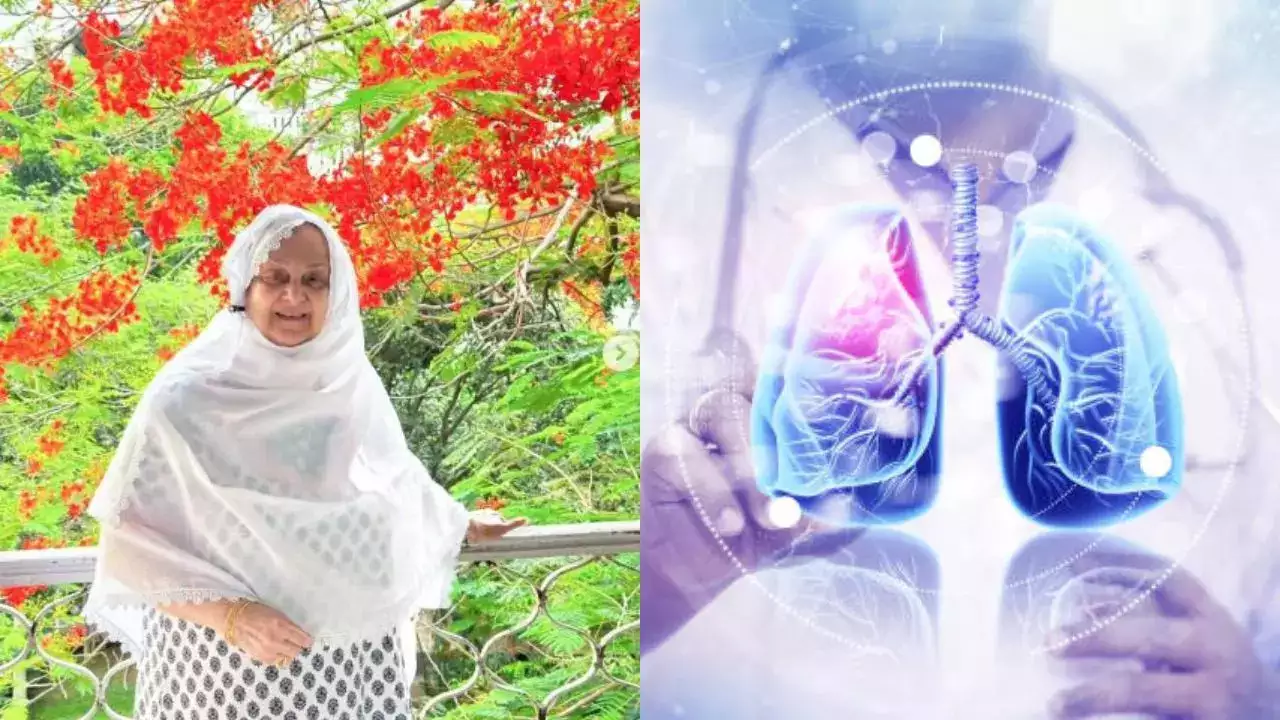
The 80-year-old was admitted to the hospital due to severe infection, which causes complications like respiratory failure, sepsis, and lung abscesses
Veteran actress Saira Banu was diagnosed with pneumonia some time back and currently is on the road to recovery. According to news reports, the 80-year-old was admitted to the hospital due to a severe infection, which can cause complications like respiratory failure, sepsis, and lung abscesses, especially in the elderly.
Known for classic movies like Padosan and Victoria No. 203, Banu revealed to ETimes exclusively, “I am fine by god's grace" despite facing ongoing health challenges, including two clots in her calf.
What is pneumonia?
Pneumonia is an infection in your lungs caused by bacteria, viruses, or fungi. Doctors say pneumonia causes your lung tissue to swell, which leads to fluid or pus in your lungs. Bacterial pneumonia is usually more severe than viral pneumonia – which mostly resolves on its own.
Pneumonia can affect one or both lungs. Pneumonia in both of your lungs is called bilateral or double pneumonia.
Different types of pneumonia
Doctors categorize pneumonia by which pathogen has caused it and how you got it. A few of these are:
Bacteria
Bacterium Streptococcus pneumoniae causes this infection, also known as pneumococcal disease. It can also lead to ear infections, sinus infections, and meningitis. Mycoplasma pneumoniae bacteria cause atypical pneumonia, which usually has milder symptoms.
Viruses
Viruses that cause the common cold, the flu, COVID-19, and respiratory syncytial virus can sometimes lead to pneumonia.
Fungi
Fungi like Cryptococcus, Pneumocystis jirovecii, and Coccidioides are uncommon causes of pneumonia. People with compromised immune systems are most at risk of getting pneumonia from a fungus.
Protozoa
Rarely, protozoa like Toxoplasma cause pneumonia.
Who is at the most risk of getting pneumonia?
You are at an increased risk of pneumonia if you:
- Are over the age of 65 years and or under the age of 2
- Are living with a lung or heart condition like asthma or chronic obstructive pulmonary disease
- Are living with a neurological condition that makes swallowing difficult, like dementia, Parkinson’s disease, or stroke
- Are you in the hospital or at a long-term care facility
- Smoke
- Are pregnant
- Have a weakened immune system
Signs and symptoms of pneumonia
Doctors say the symptoms of pneumonia depend on the cause and the symptoms range from mild to severe. Babies, young children, and older adults may have different symptoms. A few of these include:
- High fever
- Cough with yellow, green, or bloody mucus
- Tiredness and severe fatigue
- Rapid breathing
- Breathlessness
- Rapid heart rate
- Sweating or chills
- Chest or abdominal pain
- Loss of appetite
- Bluish skin, lips, or nails
- Confusion or altered mental state
What causes older people to get pneumonia?
Usually, most people get pneumonia from someone close to them. For this reason, pneumonia among the older generation can be very dangerous.
Older people can also get pneumonia from hospitals or extended stays in medical facilities. Both of these environments are full of germs and strains of pneumonia that may be more difficult to treat with antibiotics.
Among the elderly, those over 65 years of age or with weakened immune systems may have mild or less noticeable symptoms of pneumonia-like cough and breathlessness. Symptoms of ongoing health conditions may worsen. Older adults experience:
- A sudden change in mental state
- Low appetite
- Fatigue
Ways to manage pneumonia among the elderly
Doctors say pneumonia can be dangerous for elderly people s a few over-the-counter medications and other at-home treatments can help them feel better and manage the symptoms. A few of these include:
- Eat healthy foods
- Drink lots of fluids
- Limit your alcohol intake
- Not smoking cigarettes
- Getting a regulated and uninterrupted sleep
- Exercise regularly
Get Latest News Live on Times Now along with Breaking News and Top Headlines from Health and around the world.
